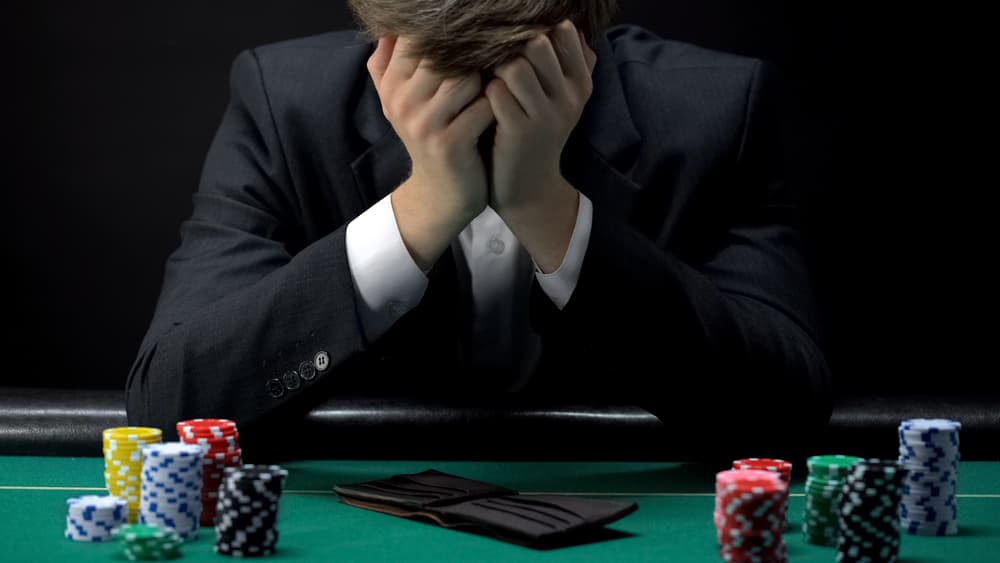Scared Money
It’s a tag that nobody in poker ever wants to be associated. Scared money is a major problem that permeates the poker world. It’s not exclusive to low stakes and beginners. Far from it, seasoned semi-professionals in mid and high stakes games fall victim to it too. They may not accept it yet, perhaps they attribute their losses to other factors, but the reality is scared money is a potential problem for all poker players. Fortunately for you, we are going to share what scared money is, the pitfalls that come with it and more importantly, offer tips to help you avoid becoming it.
What is Scared Money in Poker?
The expression scared money means a player is nervous or scared to lose their chips or money. As such, their decision making is impaired and likely to cause them play worse. Scared money is funds that a player for whatever reason cannot afford to lose and subsequently easy to attack and bluff out of pots.
The Signs of Scared Money at the Poker Table
Since playing afraid is an undesirable state to be in, as sharks we should be on the lookout for scared money. There are some obvious signs to tell when a player is fearful of losing. Here are some below.
Playing Fewer Tables
Generally, players who are fearful of losing money are going to reduce the tables they play. So, if you are playing with someone who regularly 4 tables but seems a bit off, search them up in the lobby. If they are now playing two tables, they may well be scared money and trying to limit variance.
Tightening Up
A natural reaction to playing scared is to be conservative. You’ll notice that a play who may be accustomed to a LAG style is playing fewer hands. This is an instinctive action players take when fearful of losing. They stick to only playing premium hands.
Folding Too Much on the River
Another commonality among those playing scared is to fold a lot on the river. When you get to the last card, the pot is often at it’s largest. Facing an over-bet is a lot of pressure to face when a player is concerned about going broke. For this reason, you will often see a player fold on the river when facing a big bet unless they hold the nuts or near nuts.
Facial Expressions (Live Tells)
In live games, scared money is easy to detect. Perhaps it’s the first time they’ve moved up in stakes or trying poker for first time but with money they shouldn’t be gambling. Unlike online poker where you can’t see their face, scared money is easy to pick up on just through their facial expressions. The post-flop action may put a scared money player through turmoil. You can see it plain on their face that they should not be involved in the game.

How to Exploit Scared Money
Now you know the signs, we need to recognise how to exploit them. It’s very simple really, bully them into submission. Anyone playing in a game that they can’t afford to or with money they shouldn’t be is liable to get beaten up (metaphorically). Relentless aggression is the ideal strategy against these players. This involves stealing their blinds, 3-betting them liberally and executing over-bet bluffs. This works on most gambling sites, see here for a list.
Pure aggression isn’t the only way to exploit scared money though. We also need to recognise that since their bluffing post flop is greatly reduced, we need to limit our calls. The majority of their post-flop betting is going to be for value. Therefore, we need to ensure we have a very strong hand to call them down.
Finally, another way to exploit them is to ensure our value bets are correctly sized. This may seem a little too logical and not very GTO to bet big on bluffs and small on value, but at low stakes exploitative poker is the best style. So, ensure your value bets still get called. This might mean only betting 25% on the river if your opponent has a perceived weak hand. After all, a player on scared money is harder to get paid off from.
How to Avoid Being Scared Money
The best way to avoid playing scared is to ensure you’re practicing solid bankroll management. That is just the tip of the iceberg though. You also need to make sure you’re playing in the correct game and stakes that are appropriate to your level. Scared money only rears its head when you are playing out of your depth financially or technically so these are easy ones to avoid if you adopt a conservative mindset to the games you play.
It can also pose an issue when you have problems outside of poker and mentally not with it. If you are in peril financially with your personal life, it can spill out on to the poker table. To avoid this, we recommend taking regular breaks from poker and only returning when you’re mentally prepared.
If you’re losing regularly and unsure if it’s down to being scared or something else, it might be worth us reviewing how you play? You can take advantage of 50% discount on a hand history review session by clicking below. We will look over your play and identify any potential issues that can be ironed out.




